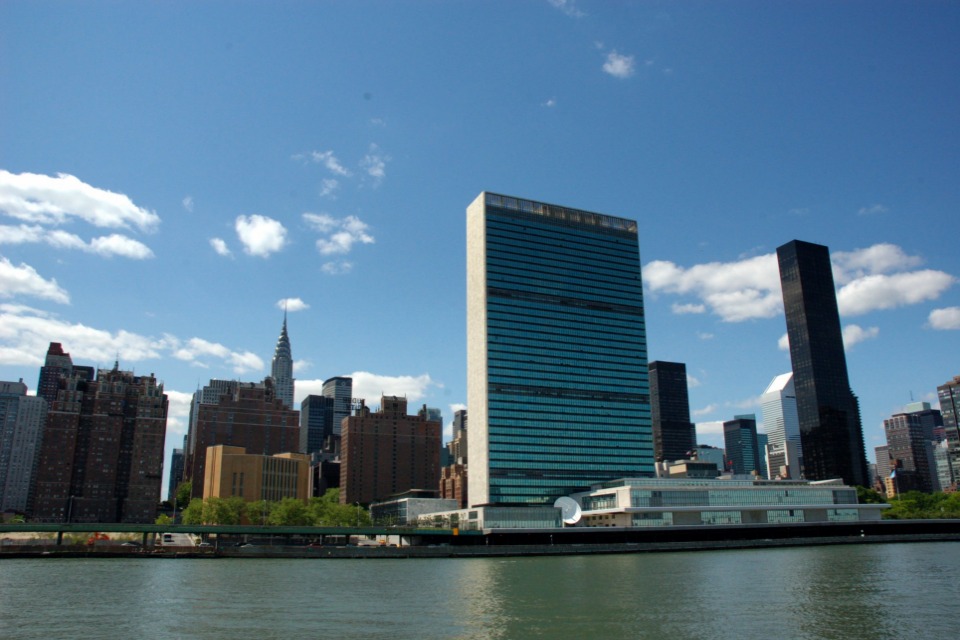"It is clear to see how much of the Council’s time this month has been taken up with emerging and worsening crises."
Remarks delivered by UK Ambassador Mark Lyall Grant during the UN Security Council Wrap-Up Session

Thank you, Mr President, for all of your and your team’s, hard work during this month’s Presidency, and for convening today’s wrap-up session. I particularly welcome the fact that this session is being held in public. It is good to see the Council can build on its past practice and enhance the transparency of these discussions. I hope to repeat this format at the end of our Presidency next month.
Mr President,
Comparing the Programme of Work issued at the start of the month with the current Programme of Work, it is clear to see how much of the Council’s time this month has been taken up with emerging and worsening crises. We have had emergency meetings on weekends, and late into the night, and unforeseen adoptions at short notice.
This included the unanimous adoption of Resolution 2165, on the 14 July, which marked a major step forward in our efforts to respond to the suffering in Syria and cut through the obstructions that the regime had been putting in the way of delivering humanitarian aid directly to those in need.
Mr President,
The shooting down of Malaysian Airlines Flight 17 over eastern Ukraine, shocked us all. The Council came together quickly to respond through a press statement, and followed this in short order with the adoption of Resolution 2166 demanding dignified and respectful treatment of the bodies of the victims, immediate access to the crash site, and full cooperation by all States with the investigation and with efforts to establish accountability.
Disgracefully, the pro-Russian separatists in control of the crash site have from the very first day tried to cover up what happened: they treated the victims’ bodies with appalling disrespect; they were deliberately slow to provide access, preventing the professional and rapid follow up action that was needed to secure evidence at the site. These actions created untold additional distress to the families of the victims.
Mr President,
The Council has a collective responsibility for the maintenance of international peace and security. But every member also has an individual responsibility to meet the obligations set out in the Charter. The Russian Federation has not lived up to these responsibilities. Quite apart from illegally annexing Crimea, the Russia Federation could have ended the fighting in eastern Ukraine weeks ago. Instead, it has sought to foment the unrest: providing weapons and political support to the separatists; with predictably tragic consequences. Against this, President Poroshenko has provided repeated opportunities for the separatists to engage in dialogue, removing entirely their basis for taking up arms.
For this reason, the Council will have to keep its attention on the situation in eastern Ukraine during the month of August.
Mr President,
The Council has also had to respond with emergency meetings this month to the terrible situation in Gaza. It is deeply tragic that so many innocent civilians have been killed and injured in the current crisis. Both sides must do their utmost to de-escalate the situation and avoid further injury and loss of innocent life. The people of Israel have the right to live without constant fear for their security, but the people of Gaza also have the right to live safely in peace.
The adoption of a Presidential Statement late on Sunday night, on the eve of Eid al Fitr, underlined this Council’s concern at the conflict and echoed the call by the Secretary-General for an immediate and unconditional humanitarian ceasefire. While we must do all that we can to alleviate the suffering – and the United Kingdom is providing $3 million to help UNRWA in this regard – the priority must be to achieve a durable ceasefire that ends the cycle of violence.
A ceasefire agreement must therefore address the underlying causes of the crisis. It needs to secure full implementation of both Security Council Resolution 1860 and the November 2012 ceasefire agreement. There will need to be concerted action to get a grip on the security situation and open up Gaza’s economy. The Palestinian Authority must return to Gaza.
Until the crisis is resolved, the Council must remain ready to do what it can, reinforcing the messages and actions of international partners to bring about a comprehensive and lasting peace.
Finally, Mr President, let me congratulate you for your open debate on peacekeeping and regional partnerships on Monday. This was a welcome and thoughtful follow to the debate on new trends in peacekeeping, held under the Russian Presidency in June.
Making peacekeeping operations efficient and effective remains a vital strand of work for the Council and the Secretariat. The Secretary-General’s review of peacekeeping will form a central part of this.
At the same time, the more this Council can do to prevent conflict, the less we will have to turn to the last resort of deploying a peacekeeping operation. Looking ahead to our Presidency, we plan to hold an open debate on this topic to ask questions about what more the Council should be doing to respond to the early warning signs we can all see, and take the early action that would help to prevent conflict escalating.
Thank you, Mr President.